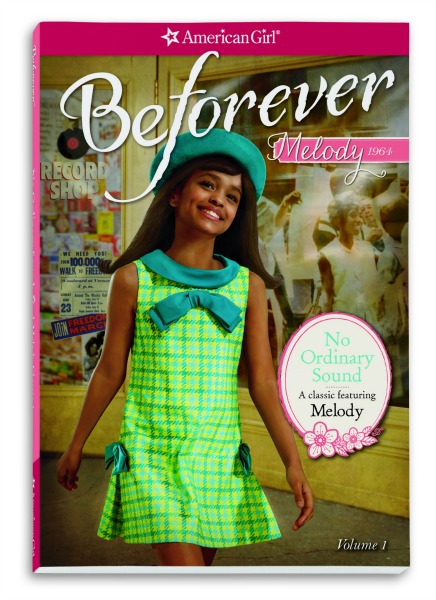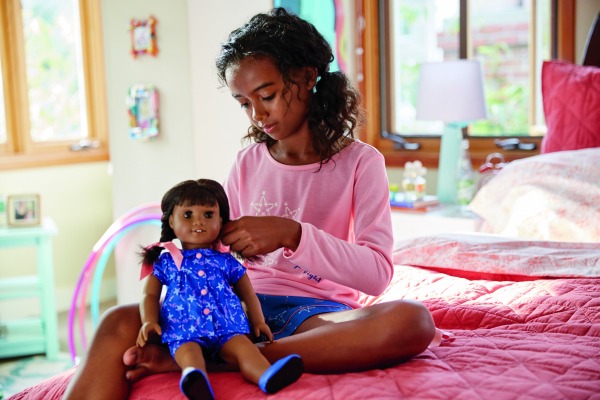American Girl Author Denise Lewis Patrick Talks Melody Ellison’s Story, Racism & That Hair Flip
 I know you studied journalism initially but what drew you to write for children?
I know you studied journalism initially but what drew you to write for children?
I never thought I would be writing for children. I thought that when I came out of college as a journalism major, that I would be write for a magazines and that I was going to be doing feature type articles. And I ended up getting a job at Scholastic working in their magazine division. So it was news, I was writing news for kids and features because the staffs were small and it was a lot of work. And it was a really intense introduction to writing for kids. But because it was non-fiction and it was actually news, I always say that’s where I learned how to write for kids because it’s not about condescension. It’s about how do you explain these things so a kid could make sense of it.
Leaving Scholastic, I went into children’s publishing. I did a little educational stuff and then freelance stuff. I kind of found myself in it but I did enjoy it. And ten years in, my husband and my girlfriend, who’s since passed away, said, ‘Why aren’t you doing your own stuff?’ And I was like, ‘I don’t know.’ And they said, ‘Why don’t you know?’ So my girlfriend, who was also working in publishing, called me and said, ‘I found you an agent. And I told her all about you. And you’re going to call her.’ And I was like ‘You’re so bossy. What are you doing?’ My first picture book, Red Dancing Shoes was published as a result of that and did really well. And I was hooked on doing it and the freedom of telling the things that I wanted to tell.
You’ve worked with American Girl before. How was the experience working with Cecilé vs Melody’s stories different?
I would say the biggest difference is probably socioeconomic. Because Cecile being a free girl of color, in New Orleans, at that time, actually was more prosperous than many of the other non-people of color in New Orleans at that time. It was important to show that at that time it was important to show Black professionals. I would say Cecile, even though there were things going on, she wouldn’t have been aware. Totally different cultural and economic situation than Melody.
Melody is kind of dearer to me because that was my time.

Tell me about the role hair played in the creation of Melody the doll and her story.
That was a big discussion because we talked about growing up— and that was interesting too — because there were four Black women on the board we all grew up in different parts of the country. And we talked about how that was such a big part of Black culture. As a little girl, you wouldn’t have bangs. And then there was a whole side discussion, should she have bangs. And we said, well she can have bangs but they can’t be cut because nobody let us cut our hair, that was taboo. And we would have to wear a roller and you would roll it up really tight. And you wouldn’t have bangs anymore when your hair fell down, you’d come that back. But you could wear it down for special occasions. We had a whole hot comb discussion. And that was funny too because they brought in hair samples. And I like where the hair has ended up. We all wanted that little flip, even if we weren’t allowed to have it.
I grew up with the Addy doll and loved her story but when I got older, I saw other women my age were discouraged by the fact that Addy had a history in slavery. So do you think it’s important that Melody not have a history in slavery or that girls will be able to relate to her even more?
Again…complicated. Melody first. I think that the fact that Melody is, what I would call, contemporary history makes her more accessible to kids today, particularly right now. Five years ago, it might have been different because of the things that are going on in this country and in the world. And we won’t even get into the fashion and the music and the Motown connection, because Motown is forever too. So kids probably know that more than they know the movement. In many households, connections are being made in family discussions about things that are going on now and things that went on in the sixties and fifties.
Having sons, I didn’t have Addy. And I was aged out of Addy but I knew about Addy. I find that response very interesting; I think, because in reality that is our history. And on the one hand we have to accept that is a part of our history. All of it is a part of who we are in this country, living here and how we came to be where we are right now. I think it’s a matter of context. When you were a kid you might have loved the doll and then when you were 25 you might have said ‘why did she have to have been a slave?’ Well, many people were. That was the reality. Many people had this kind of life where they had to overcome all of the deficits of having been a slave, on a personal level. What’s amazing to me, which many people don’t know, is that in that period after Emancipation, the rate of Black people educating themselves was off the charts, off the charts. People went to all kinds of lengths to educate themselves and their children. They would look for teachers, they would pay for somebody from their community to go to school and come back to teach. And that’s a part of kind of who we are. And that awful situation is what made us hungry to create different kinds of lives. And to create the kinds of lives that we wanted and deserved. It’ll be interesting, twenty years down the line, to see what these little girls today say about Melody. Because who knows what will be going on in their world at that point. I think Addy was just as important as any of the other characters, as important as Melody in a different way because they form part of the whole.
Can you speak about the timeliness of the release of this story and the Black Lives Matter movement? And it’s not just about what’s going on here but all over the world, people are fighting for equality.
What I have to say about that is that it’s ongoing. And that the search for—the demand for justice and equal treatment and equal rights across the board, globally is an ongoing situation. And the importance of Melody’s story is to show that this is not something that’s over. The quest and the right that we all have to be treated fairly, is always there. We always have to be aware. We can’t be complacent. That’s a big word for little kids but I think in connecting—parents who are already trying to talk to their kids about the stuff that’s going on now—are making connections on some level. Yes, some things have changed but then there are other issues that we still need to be aware of, as individuals. We need to make sure that we are helping to promote equality of all kinds and not hindering the process. Or not feeling like, ‘Ok, I’m fine. So everything’s fine.’ I think we just have to have our eyes open.
Veronica Wells is the culture editor for MadameNoire.com. She is also the author of “Bettah Days.”









